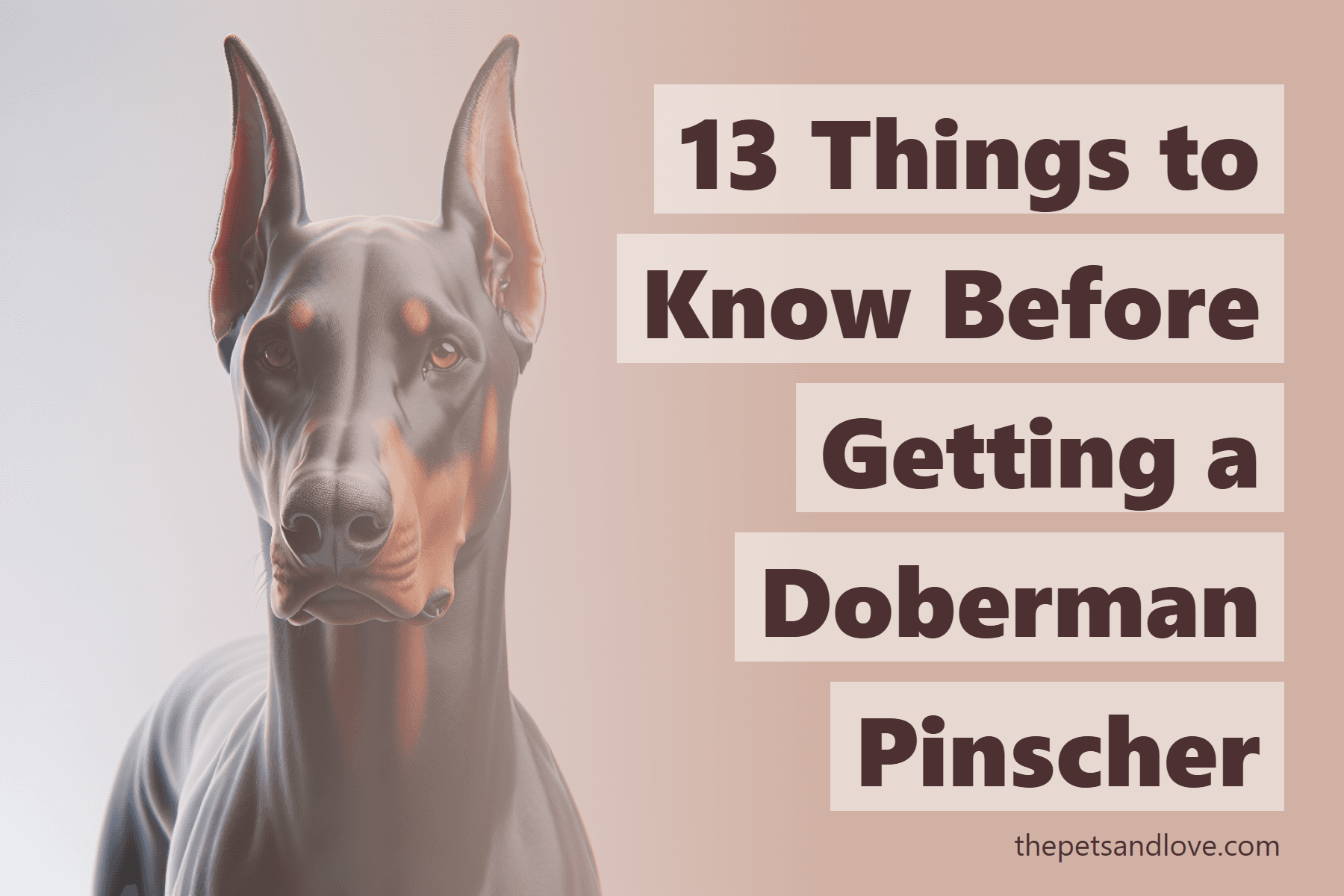13 Things to Know Before Getting a Doberman Pinscher

Thinking about adding a Doberman Pinscher to your life? They’re stunning, loyal, and incredibly smart — but they’re not the kind of dog you can bring home on a whim. I've met a few Dobermans over the years and let me tell you, they can be amazing companions if you're ready for their energy and intensity. Here's what you really need to know before diving in.
1. Dobermans Need to Move — A Lot
These dogs are high-drive athletes. If you’re not ready for daily walks, runs, play sessions, and mental stimulation (yes, brain work counts!), a Doberman will quickly become bored and frustrated. And a bored Doberman might redecorate your home… with teeth.
I’ve seen Dobies thrive in active homes that offer variety: fetch, agility, puzzle toys, structured obedience — you name it. If you're more of a couch potato, this probably isn't your breed.
2. Smart, but Not Always Easy
Dobermans are whip-smart, but they’re not pushovers. They need confident, consistent training from the start. If you don't show leadership, they’ll happily take charge — and not always in ways you’d like.
Early obedience training is a must. If you’re new to dogs or struggling, don’t hesitate to call in a pro trainer who understands working breeds. A little help early on can save you from bad habits later.
3. Socialization is Non-Negotiable
Dobermans are naturally protective. That’s part of their charm — they’ll love your family fiercely — but it also means they can be wary or even reactive around strangers and other animals if not socialized well.
Start young and expose them to all kinds of people, places, and situations. The goal? A confident dog who can tell the difference between a real threat and the mailman.
4. They’re Built to Guard
Dobermans are alert, loyal, and brave — they make excellent watchdogs. But that protective streak needs to be shaped. Proper training teaches them when it’s okay to defend and when it’s time to chill.
The worst thing you can do is encourage aggression without control. A well-trained Doberman is a calm, confident protector — not a liability.
5. Low Grooming, Some Shedding
Their sleek coat is low-maintenance, but yes, they shed. A weekly brushing helps keep the fur tumbleweeds under control. Don’t forget the basics: nail trims, dental care, ear cleaning, and baths when needed.
6. Health Matters
Like many purebreds, Dobermans are prone to certain health issues — especially dilated cardiomyopathy (DCM), hip dysplasia, and von Willebrand's disease (a bleeding disorder). Regular vet visits, proper diet, and not over-exercising pups can help catch or prevent problems early.
7. Not Built for Harsh Weather
Dobermans don’t tolerate extreme heat or cold well. Their short coat doesn’t offer much insulation, so they shouldn’t be left outside for long periods — especially in winter or during heatwaves. They’re indoor dogs, plain and simple.
8. Separation Anxiety is Common
This breed bonds hard with their people — which is beautiful, but it also means they don’t do well left alone for long stretches. Without enough company or stimulation, Dobies can become anxious and destructive.
If you work long hours, make a plan: puzzle toys, dog walkers, a comfy crate or designated safe space, and gradual training to build their independence.
9. They’re Big Softies with Their Family
Despite the tough exterior, Dobermans are affectionate and people-oriented. They’ll follow you from room to room, lean into you for pets, and want to be part of everything.
They’re great family dogs with the right upbringing — loving, loyal, and eager to please.
10. Feed Them Right
A high-quality diet made for large, active breeds is a must. Dobermans grow fast and need the right nutrients to support their joints, heart, and energy levels. Always have fresh water available, especially in warm weather.
11. Apartments? Not Ideal
Dobermans need space to stretch those long legs. A fenced yard is ideal, but if you’re in an apartment, be prepared to put in extra work with structured exercise and mental enrichment. They won’t thrive in a cramped space without a solid outlet for their energy.
12. They Can Be Barky
Dobermans are vocal, especially if bored or under-stimulated. Training and routine help reduce nuisance barking, but be realistic — they’re guard dogs at heart.
13. They’re Big and Strong
A full-grown Doberman can weigh up to 100 pounds and is pure muscle. That power needs to be managed with training and respect. You can’t let them pull on the leash or run wild — not just for your sake, but for everyone’s safety.
Bottom line? Dobermans are incredible dogs for the right person. They need time, training, and a lot of interaction — but in return, you get a loyal, loving, and protective companion who’ll stand by your side through anything.
If you're ready to put in the work, a Doberman can be one of the most rewarding dogs you'll ever meet.
Take the Quiz
Is a Doberman Pinscher Right for You?
The Doberman Pinscher is known for its intelligence, loyalty, and strong protective instincts. Take the quiz to see if this energetic and vigilant breed is your perfect match. Answer all questions below to discover your compatibility score and get personalized insights.
Question #1: What is the main reason you want a dog?
Question #2: How active is your lifestyle?
Question #3: How much time can you dedicate to your dog daily?
Question #4: What best describes your home environment?
Question #5: What size dog do you prefer?
Question #6: What personality traits do you want in your dog?
Question #7: How much grooming can you handle?
Question #8: Who else lives with the dog?
Question #9: Is this your first dog?
Please answer all 9 questions to see your results
